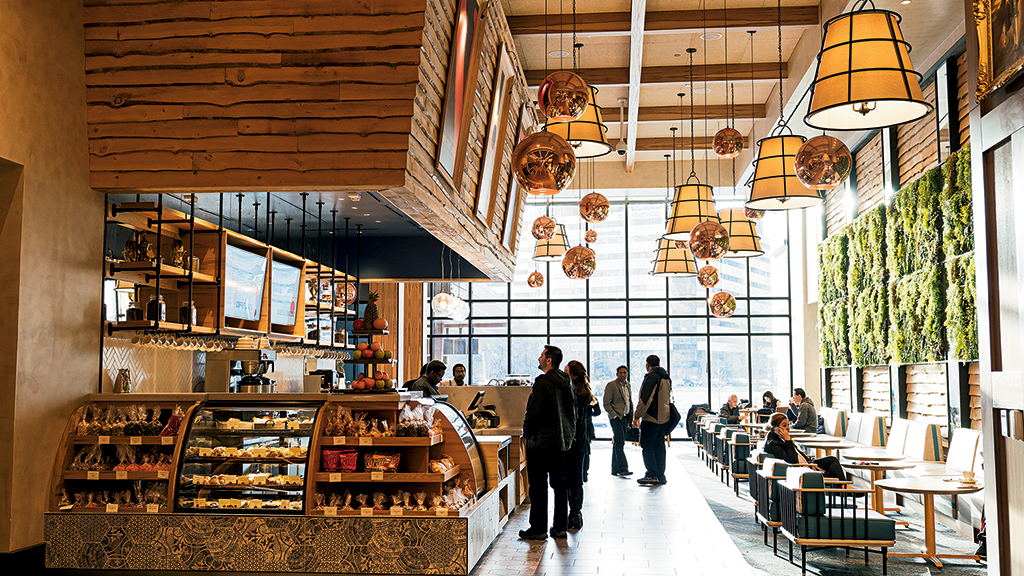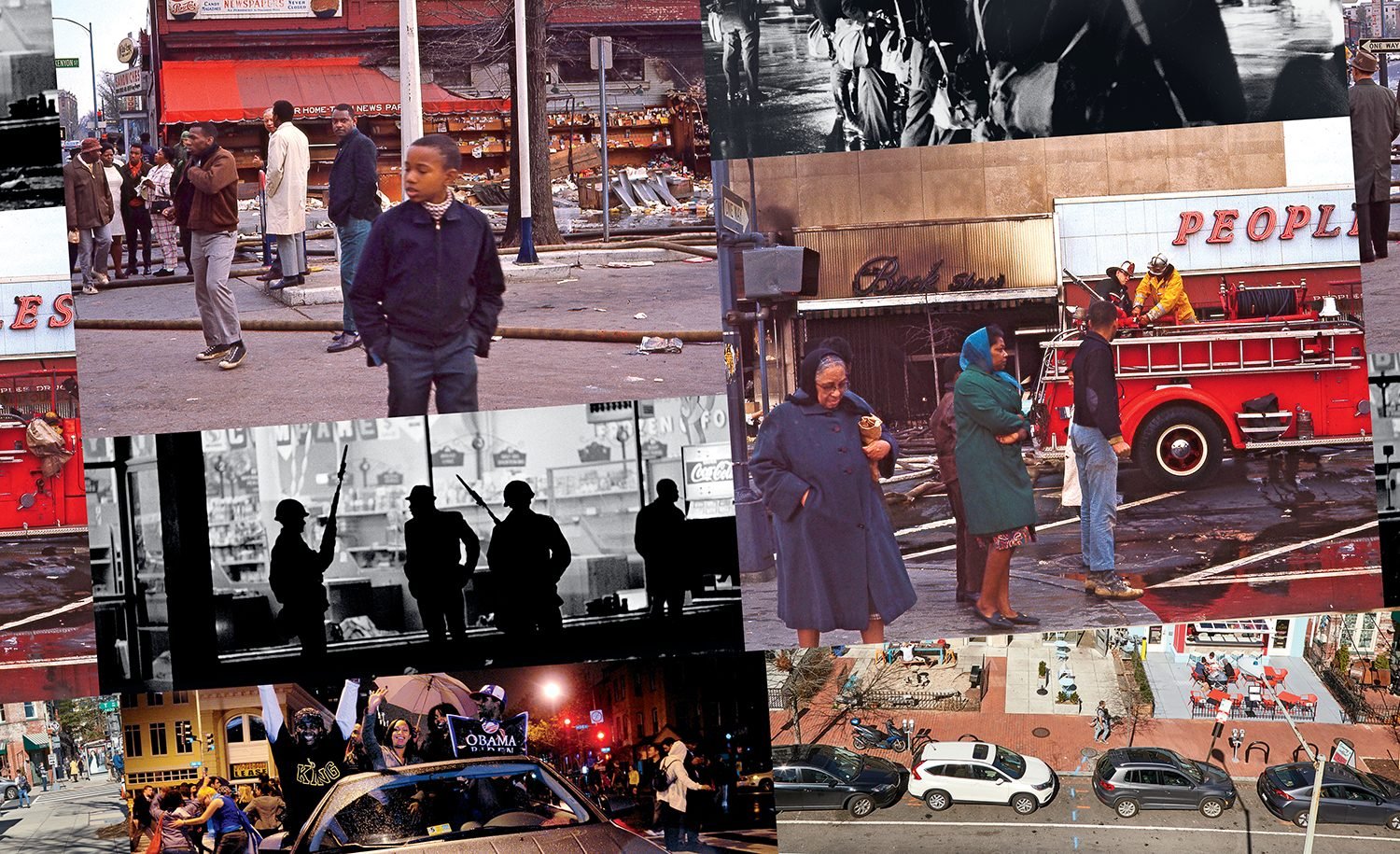One of the top women to work in Mike Isabella‘s multimillion-dollar restaurant empire is accusing the restaurateur and his business partners of calling female employees “whores” and “bitches,” unwanted touching, bragging about exploits with prostitutes, and other sexist behavior in the first major harassment scandal to hit the DC dining scene in the “Me Too” era.
As first reported by the Washington Post, former Isabella Eatery Director of Operations Chloe Caras filed a lawsuit in DC Superior Court on Monday against Isabella, Beverage Director Taha Ismail, Kapnos Executive Chef George Pagonis, Director Nick Pagonis, and CFO Johannes Allender outlining what she calls recurring instances of abuse during her three year tenure with the company.
Among the many allegations, Caras claims that the partners created a “bro culture,” where vulgar, degrading comments about women were the norm and inappropriate sexual behavior was accepted. Tensions allegedly culminated in a blowout fight with Isabella at the restaurateur’s new mega-food hall in Tysons Galleria, Isabella Eatery, in which she says he fired her in a profanity-laced, drunken tirade. He says she “stormed off the job” and refused to return to work.
As of this morning, Mike Isabella Concepts attorney Brian Bregman said he had not yet seen a copy of the complaint but would reach out to his clients for responses to some of the specific allegations. Last night, the lawyer released a two-page statement on behalf of Isabella and his partners calling the allegations of a hostile work environment “false.” Isabella also denies allegations of unwanted physical contact: In one instance, Caras says he pulled her hair and pantomimed having sex with her from behind. In another, a pastry sous chef says the restaurateur kissed her on the cheek without consent and declared he’d make her a superstar.
“Not only are these allegations unsupported by any evidence, but countless MIC employees can confirm that these types of behaviors simply do not occur at the restaurants,” the statement reads.
Isabella and his partners describe Caras as a “single disgruntled co-owner of the company” (she told the Post she owns a small share in Arlington’s Yona restaurant) and say that her accusations are supported only by former employees who are her friends. They bolster their defense by saying 60 percent of the company’s top management and leadership personnel are women and that Caras was replaced by a woman.
“As with any case of former business partners and employees, there is much more to this story,” the MIC statement continues. “Ms. Caras engaged in the very same banter, language, and horseplay that she now claims created a hostile working atmosphere. MIC has the same, if not many more, of these text messages, incidents, and write-ups of serious misconduct at work, to show that Ms. Caras’ portrayal as a victim is, again, untrue.”
In her lawsuit, Caras admits that she “occasionally” used offensive language in an effort get along with the partners—even though it made her uncomfortable. But over time, she says she stopped using offensive terms. Still, it looks like Isabella’s group plan to use that in their case:
“MIC is prepared to litigate these issues in the public forum and to bring out all of the detailed text messages and communications, as Ms. Caras filed this lawsuit only after MIC refused to meet her financial demands over the course of the past several weeks,” the statement reads.
When it comes to their own bad language, Isabella and his partners also appear to use something along the lines of a Trump-style “locker room talk” justification: “Unprofessional words and profanity have been customary and historically acceptable in the restaurant industry, promoted by social media and popular television shows. Mr. Isabella and his partners regrets this and has recognized the need for change,” the statement reads.
The company established a human resource department in October 2017 and claims it started making policy changes “long before” the lawsuit.
But according Caras, the lewd language and behavior were deeply engrained into the culture of the restaurants. Her lawsuit claims Isabella and his partners loved to brag about their sexual conquests—or “taking down” and “banging” women, as they purportedly called it.
When they returned from international culinary tours, the restaurant group’s top brass allegedly boasted about sex with prostitutes and named cocktails after these exploits. One cocktail at Kapnos Taverna, the suit claims, was named “You Strong” after a comment that a prostitute was said to have made to Pagonis during a trip to Europe. Another drink dubbed the “Crossing Guard” was supposedly a nickname Isabella earned at a European brothel where, the partners explained, he “directed each prostitute to service a particular partner and told her which sex act to perform on each partner,” the suit reads.
Several other cocktails—including some still listed on the restaurant’s online menus—were also allegedly named after sexual jokes. According to the suit, in 2016, Isabella joked that Caras should name a cocktail at Mexican restaurant Pepita “itchy kitty.” Caras asked him to stop goading her, but Isabella continued to repeat the crude reference to a vagina throughout the day. He also texted the phrase to her, and when she asked him to stop, he reportedly replied, “What’s wrong, u got one?”
Isabella and his partners allegedly referred to attractive female patrons as “corn” after one chef’s comment that a woman was “so hot, [he’d] eat the corn out of her shit.” In the suit, Caras says Isabella sent her text messages with corn emojis. She also claims Isabella and his partners directed her and other hiring officials to hire women who were “hot” or “good looking.”
Caras alleges that the partners often sat at the bar of Isabella restaurants looking at photos and videos of naked or scantily clad women on their phones. She also says in the suit that Isabella brought young, attractive women, who he referred to as “girlfriends,” to nearly every restaurant opening or work event, then demanded that Caras book a hotel room for him.
The sexual behavior allegedly carried over to treatment of employees too. Caras alleges Isabella grabbed and sexually propositioned female employees and that the partners regularly commented on the size of her butt to other male employees.
In the suit, she says Isabella “routinely drank throughout the day at his restaurants” and would become belligerent and sexually inappropriate. On a number of occasions, she alleges, Isabella drunkly leaned in and asked her to kiss him, but she rejected his advances. Another time, she says Isabella and others made jokes about her wanting to sleep with him. The drinking led to angry, threatening behavior, too, the lawsuit alleges. Caras says that on one occasion while intoxicated, Isabella threw a calculator at the wall near her head during a “fit of rage.”
She also claims that on one occasion Isabella insisted his staff come with him to Empire strip club. When a female employee declined, the suit says, he “screamed at her and directed profanity-laced threats at her, including the threat to terminate her if she did not come with him to the strip club.”
Caras says she complained several times about alleged abuse but was generally blown off. In 2015, the suit alleges, Caras complained to Isabella about “undermining” behavior and “demeaning” remarks from Nick Pagonis, to which the restaurateur responded, “it’s probably because you’re a woman.” Isabella allegedly didn’t do anything to protect Caras or punish Pagonis, instead telling her he was her “biggest supporter” and assuring her that he was the “only one who matters,” the suit says.
Caras says she also dealt with “daily abuse” from Jonah Kim, a former partner and head chef of Yona, when she was general manager at the Ballston noodle shop. Over time, Kim allegedly became “hostile” to Caras when she discussed staffing or operational issues with him, and at one point threatened to “destroy” her. “You think Nick [Pagonis] gives you anxiety? I could give you so much more,” the chef allegedly said.
“I think my peers and my reputation within this industry will tell you those are false accusations,” Kim told Washingtonian via text message.
When Caras complained to Isabella, the suit says, he seemed skeptical that Kim’s behavior was as bad as she claimed and came to believe her only after other employees expressed concerns. According to Caras, Isabella fired Kim eight months later only after he “proved to be a mediocre chef.” At the time, Isabella’s PR team declined to discuss the details of Kim’s departure.
But the real breaking point was on December 5, 2017, shortly after the first phase opening of Isabella Eatery. According to the lawsuit, Caras was sitting at a booth with Isabella, who had been drinking. A chef came over to ask a question, but Caras says she only heard Isabella’s response: “If you sleep with Chloe you can.”
Caras’s account says she asked Isabella to stop, at which point he “erupted into a fit rage” and accused Caras of sexually harassing the chef. Isabella continued to yell, so Caras walked away into the kitchen. He followed. Fearing for her safety, she says she continued to ask Isabella to leave her alone. He demanded she turn around to talk with him. She didn’t. He allegedly called her “disrespectful bitch” and shouted, “If you’re going to be disrespectful, then you’re done here.” As Caras reached the exit, Isabella allegedly chased after her, calling her a “bitch” and yelling, “Love you, Chloe, nice working with you.”
According to the statement from MIC, Caras “stormed off the job and refused to return, insisting she had been fired.” The company says management and HR called and asked her to return to work and she “flatly denied to do so.”
In the fallout, Caras says she has suffered anxiety, loss of sleep, and emotional distress. Her lawsuit claims Isabella and his partners are in violation of the DC Human Rights Act and seeks damages for “pain and suffering, damage to career, and loss of enjoyment of life.”
This story has been updated with a response from chef Jonah Kim.
















